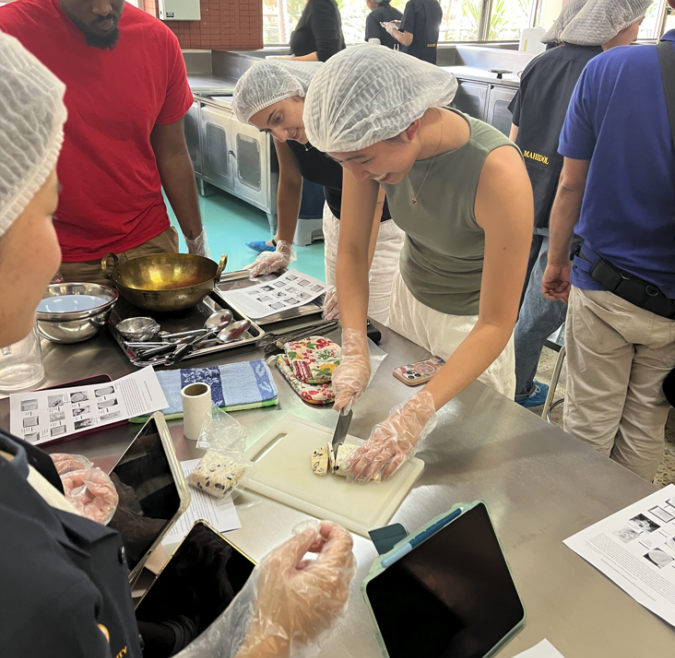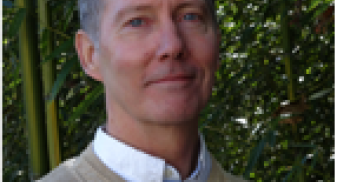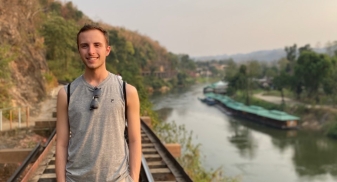Winter: Rutgers- Food and Sustainability in Thailand
The Program
Study food sustainability, food security, and food safety across multiple locations in Thailand
From production to consumption, explore issues that drive the global food industry-Sustainability, Food Safety, and Food Security-in three different regions in Thailand: Kanchanaburi, Trat, Phra Nakhon Si Ayutthaya ,and Nakhon Pathom! You will also be exposed to everyday life there, experiencing the rich Thai culture across these rural and urban landscapes from over 2500 years of tradition, in addition to food pathways from farm to table!
Program Locations
Thailand
Bangkok
Bangkok, a sprawling metropolis with a population of over 6 million people, is a city you experience with all senses. A rich cultural center, the city exhibits deep cultural influences of neighboring India, China, and Cambodia. While awash with opulent palaces, temples, and shrines, Bangkok is also a modern city with a vibrant spirit.
Thailand
Salaya
Salaya is located in Central Thailand, considered to be part of Bangkok's metropolitan region, as well as home to one of Mahidol University's three campuses in the region. The campus opened in 1982, and is filled with natural beauty, from exotic gardens to lush tropical scenery. While here, students will learn about Thailand fruits, vegetables, traditional foods, and more at the Salaya Farmer's Market

Thailand
Kanchanaburi
Kanchanaburi is a town in west Thailand. It’s known for the Thailand–Burma Railway, built during WWII. The line crosses over the River Khwae Yai via the “Death Railway” Bridge. Mahidol University's Kanchanaburi campus opened in 2001. The area surrounding the campus boasts lush forest, spectacular waterfalls, and the confluence of the Kwae Noi and Kwae Yai rivers; the source of the Mae Klong River. While here, students will engage in team-based, cross-cultural educational activities with peers and learn the history of the area.
Academics
Food and Sustainability: 11:400:315
This course is designed to appreciate the nexus of food sustainability, food security, and food safety. Students will be exposed to everyday life in Nakhon Pathom, Kanchanaburi, and Phra Nakhon Si Ayutthaya. The rich Thai culture will be highlighted across the rural to urban landscape rooted in over 2500 years of tradition. Students will learn the pathway of foods from: farm to processing, warehousing to transport, and retail (open market, supermarket, street vendor, and restaurant) to table.
By the end of this course, students will be able to:
1. Analyze global food systems through the lens of sustainability, safety, and security by tracing the full food pathway—from farm to processing, distribution, and consumption—across multiple cultural contexts in Thailand.
2. Collaborate with international peers (including students from Mahidol University) to exchange knowledge and engage in team-based, cross-cultural educational activities that promote global understanding and ethical decision-making.
3. Apply principles of sustainable change-making by examining and critiquing real-world food production practices in both rural and urban Thai settings, integrating traditional ecological knowledge with modern food system challenges.
4. Design context-sensitive solutions to complex food system issues by incorporating cultural norms, economic constraints, and environmental factors into food product development and transportation planning.
5. Demonstrate leadership in cross-cultural settings by participating in hands-on projects and reflective discussions that require them to organize, contribute to, and sometimes lead diverse teams in achieving shared sustainability goals.
Course Requirements and Grading
- Students will be provided required reading material prior to and during the course that will be used to facilitate discussion and development of discussion and critical thinking questions which will count toward the grade (30pts).
- Students will maintain a log/blog starting on arrival in Thailand. The log/blog will be will be evaluated as part of the grade (15pts). Students should consider experiences related to the culture, people, foods, and academic activities. Students may wish to have discussions with students at each of the Mahidol University campuses to understand student life at each campus.
- Student presentation (40pts)
- After return to the US students will be required to submit a course “debrief” incorporating discussion on knowledge gained – academic and cultural, course structure, Thailand – expectation vs reality. (15pts)
This course will count as a three credit, 300-level elective.
Click here to view the syllabus for winter 2026.
For information about study abroad credit transfer, registration, and transcripts please visit the Academics section of our website.
Housing and Meals
Students will stay in double rooms in Hostels/Hotels. The program cost also includes most meals. More information soon!
Financial Information
Program Costs
| NJ Resident | non-NJ Resident | |
|---|---|---|
| Undergraduate | $2,780 | $3,240 |
| Graduate | $3,060 | $3,500 |
Program Cost includes:
• Tuition
• Housing
• Most Meals
• Excursions
• Administrative Fees
• Emergency Medical Access Abroad
* The winter session student fee is not included in the program cost above.
Out-of-Pocket Costs
| Airfare | $1,750 |
| Meals | $100 |
| *Recommended vaccines (Hepatitis A and Typhoid) | 0 |
| Local Transportation | 0 |
| Personal Expenses | $150 |
| Total | $2,000.00 |
Out-of-Pocket Cost includes:
The above costs are estimations and represent the known out-of-pocket costs students encounter during their time abroad.
Some of these expenses will be paid for prior to going abroad, such as an airline ticket and visa costs, while some of these expenses, such as meals and local transportation, will be paid in-country as part of your daily expenses. As you plan, you will need to budget these costs and spend wisely throughout your time abroad.
* Price will vary based on US health insurance coverage.



